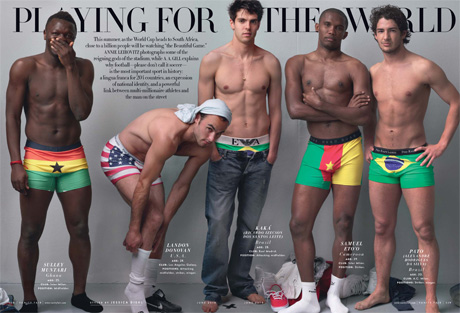With 38 days, it begins. The World Cup captivates more people around the globe than any other event, sporting or otherwise. Every four years, in pubs and corporate boardrooms, thatched huts and flophouses, fans of “the Beautiful Game” gather around televisions and transistor radios—and now, for the deep of pocket, iPhones and 3-D flat screens—to cheer for their heroes. They watch and listen by the billions, holding their breath at every corner kick, falling to their knees or leaping for joy at every goal scored. That this year’s tournament is in South Africa, where apartheid was the law of the land until 1994, only adds to the heightened sense of celebration—this is about a whole lot more than just soccer.
For the June issue of Vanity Fair, Annie Leibovitz set out to capture some of the sport’s biggest stars, including Portugal’s Cristiano Ronaldo, Ivory Coast’s Didier Drogba, Cameroon’s Samuel Eto’o, Ghana’s Sulley Muntari, the U.S.A.’s Landon Donovan, Brazil’s Kaká and Pato, Italy’s Gianluigi Buffon, Serbia’s Dejan Stankovic, England’s Carlton Cole, and Germany’s Michael Ballack. . Leibovitz’s portraits are, well, revealing. And underwear has never looked so patriotic. In America, these men might not enjoy the same name recognition as the stars of the N.F.L.—that game that we call football—but for most of the planet, they are more than just showstoppers. They are gods.A. A. Gill, in his accompanying June-issue essay, captures just how important football (don’t you dare call it “soccer,” he warns) and the World Cup are to the 6.8 billion of us who live on Planet Earth. “Football took to the world pitch at about the same time as the modern independent nation-state,” Gill writes. “After a flag, a national anthem, and a press release decrying Yankee imperialism, the next thing newly minted nations do is build a stadium and come up with a national grudge match.”
Grudges old and new will be settled (or worsened) beginning on June 11, as South Africa opens the World Cup in Soweto against Mexico. Must-see games abound from there on, with England vs. U.S.A. (June 12) and most any matchup from the so-called Group of Death—Ivory Coast vs. Portugal (June 15), Brazil vs. Ivory Coast (June 20), Portugal vs. Brazil (June 25)—topping the list from the opening round.
You don’t have to be a footie fan to enjoy the tournament. (How many of you follow swimming when it’s not the Olympics and Michael Phelps?) To keep up with all the news and festivities, check in every day with our soccer football blog, Fair Play, which will be filing from South Africa . And as you’re watching and reading, remember the closing quote to Gill’s essay, from the great Scottish player and coach Bill Shankly: “Some people believe football is a matter of life and death. I can assure you it is much, much more important than that.
Financial Analysts Agree: Brazil Will Win World Cup
As the World Cup approaches, financial analysts continue to put their market-predicting powers to work on something a bit more fun that gives them lots of free publicity. They may all use different models but are mostly coming out with the same answer and predicting that Brazil will come out on top in South Africa. So far, UBS, Danske Bank, and Evolution have all predicted that Brazil will win, reports the Financial Times. JP Morgan is the odd man out having predicted that England will take the cup. For its part, Goldman Sachs refused to pick an overall winner, but predicted the four semi-finalists: England, Argentina, Brazil, and Spain. Picking World Cup winners may be more fun than predicting the price of gold, but that doesn’t mean it’s an easy endeavor. Danske used an extremely complicated-looking formula that takes into account six factors before reaching the conclusion that the final will be played between Germany and Brazil.
